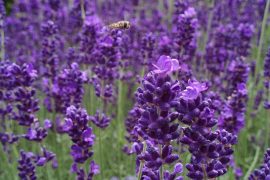12 Herbs and Flowers to Repel unwanted insects


For those who would like to give the natural route a try, we’ve described six easy-to-find herbs readily available at most nurseries that are said to repel mosquitoes and other annoying insects. The smell from fragrant herbs is the result of the distribution of tiny globules that contain oils. High temperatures, for example, can cause the globules to become volatile, evaporating the essential oils and turning them into vapors, Pennisi says. The many globules on the underside of rosemary leaves (seen at right) are one of the best examples of this.We’ve included our take on five ornamental flowers that can help keep plant-attacking insects at bay. Keeping your growing areas as insect free as possible will help your vegetable garden stay productive and your ornamental beds attractive. In addition, we’ve included a carnivorous plant that eats insects which you can also include in your eco-friendly insect barrier.What plants are you growing that reduce your insect populations? Please share your results in the comments section. Here’s our list of 12 plants.HerbsBasilRepels house flies and mosquitoes. Plant basil in containers by your house doors and in outdoor areas where you like to relax or entertain. Basil is delicious in salads, in many pork and chicken recipes and with a variety of soups. You also can use fresh basil to make an insect repellent spray. A simple recipe calls for pouring 4 ounces of boiling water into a container holding 4 to 6 ounces of clean, fresh basil leaves (stems can be attached), letting the leaves steep for several hours, removing the leaves and squeezing all of the leaves’ moisture into the mixture. Then thoroughly mix 4 ounces of (cheap!) vodka with the basil-water mixture. Store in the refrigerator and apply as a spray when going outdoors. Be sure to keep the spray away from your eyes, nose and mouth.LavenderRepels moths, fleas, flies and mosquitoes. Lavender has been used for centuries to add a pleasantly sweet fragrance to homes and clothes drawers. Although people love the smell of lavender, mosquitoes, flies and other unwanted insects hate it. Place tied bouquets in your home to help keep flies outdoors. Plant it in sunny areas of the garden or near entryways to your house to help keep those areas pest free. You can also use oil extracted from the flowers as a mosquito repellent you can apply to exposed skin when going into the garden or patio. .LemongrassRepels mosquitoes. You’ve no doubt seen citronella candles in stores during the summer. Citronella is a natural oil found in lemongrass, an ornamental that can grow up to 4 feet tall and 3 feet wide in one season. This grass with wonderful culinary uses is hardy only in South Florida (Zone 10), so almost everyone will have to grow it as an annual. It does well in a pot or in the ground in a sunny, well-drained location.Lemon thymeRepels mosquitoes. This hardy herb can adapt to dry or rocky, shallow soil and will thrive in your herb garden, a rock garden or a front border as long as these are in sunny locations. The plant itself will not repel pesky mosquitoes. To release its chemicals, you must first bruise the leaves. To do this, simply cut off a few stems and rub them between your hands. Before you do that, though, it’s advisable to make sure the plant’s natural properties will not adversely affect you. Determine your tolerance by rubbing crushed leaves on a small area on your forearm for several days.MintRepels mosquitoes. Mint is best grown in pots rather than the ground because it spreads aggressively. Once established in the garden, it can be difficult to remove. The leaves are commonly used to flavor iced tea. The aromatic properties found in the leaves are also present in the stems and flowers. With a little work, the plant’s aromatic oils can be extracted and combined with apple cider vinegar and cheap vodka (or witch hazel) to make a mosquito repellent. Containers of mint strategically placed in the garden or on the patio will help keep nearby plants insect free.Rosemary
Repels mosquitoes and a variety of insects harmful to vegetable plants. Rosemary is available in various forms. Plants can be grown in containers on a patio and shaped into ornamental pyramids, grown in herb gardens or planted in landscaped beds, where some varieties can grow quite large. Rosemary’s oils are unpleasant to many insects. The plant itself and its cuttings are effective repellents. You can make a simple repellent spray by boiling 1 quart of dried rosemary in a quart of water for 20 to 30 minutes and then straining the liquid into a container at least a half-gallon in size that contains a quart of cool water. Put a cap on the combined liquid and store it in the refrigerator. Add the repellent to small squirt bottles as needed when going outdoors. Discard the remaining repellent in the refrigerator when it no longer has a strong telltale smell of rosemary.
The list isn’t complete! To see the rest of 12 plants that repel unwanted insects visit www.mnn.com
Source: mnn.com